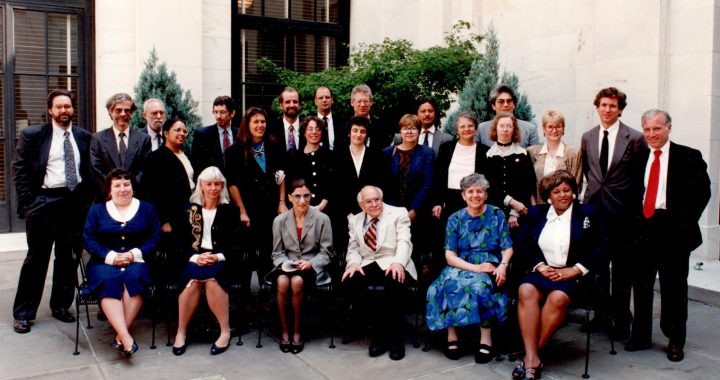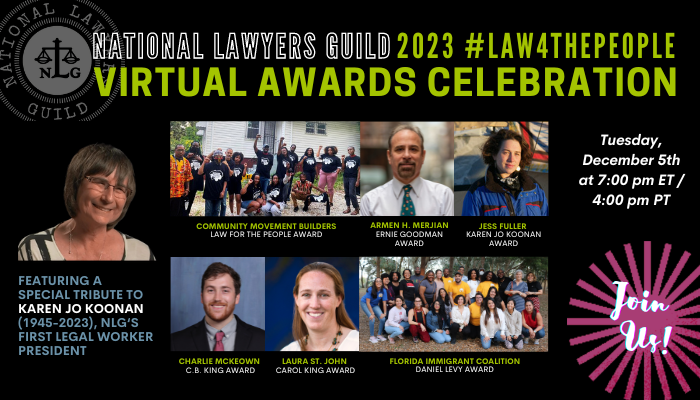The National Lawyers Guild (NLG) joins people across the country and throughout the world in mourning the death of U.S. Supreme Court Associate Justice Ruth Bader Ginsburg. Our commitment to human rights is one Justice Ginsberg attempted to uphold throughout her lifetime of service, and we vehemently oppose any attempts to exploit her death as an opportunity to further he oppression and suffering of people of this country. As such, we also insist that the naming and confirmation of her replacement not take place until after the Presidential election in November.
From co-founding in 1970 the Women’s Rights Law Reporter, the first law journal in the country to focus exclusively on women’s rights, to co-authoring the first law school casebook on sex discrimination, Justice Ginsburg was committed to furthering the legally recognized rights of women in the U.S. In 1972, Justice Ginsburg founded the Women’s Rights Project at the ACLU, later becoming the project’s general counsel overseeing the its participation in more than 300 gender discrimination cases in a single year.
From attorney to a seat on the D.C. Court of Appeals to the U.S. Supreme Court, Justice Ginsburg helped advance legal equality for women, persons of color, persons with disabilities and marginalized communities across the country, persuading a majority on the Supreme Court and authoring the opinions in United States v. Virginia (striking down prohibition of admission of women to the Virginia Military Academy), Olmstead v. L.C. (persons with disabilities entitled to community-based housing under the Americans with Disabilities Act) and Friends of the Earth v. Laidlaw Environmental Services (giving residents of South Carolina standing to seek penalties for industrial pollution without having to prove injury.)
Just as important, if not more, were Justice Ginsburg’s dissenting opinions. In Ledbetter v. Goodyear Tire and Rubber, her dissent was essential to subsequent Congressional action extending the time frame for a woman to bring suit for equal pay. More recently in Shelby County v. Holder, Justice Ginsburg’s dissenting opinion in a case that gutted the Voting Rights Act of 1965, helps to inspire and guide the all-important battle against voter suppression unfolding across the country.
The death of Justice Ginsburg comes at the most critical juncture in recent American political history. The political machinations now underway by the Trump administration to quickly fill her position with a reactionary replacement are part and parcel of the country’s creep towards fascism, and the current administration’s corruption and white supremacist agenda, which Justice Ginsburg vehemently condemned.
Today, we stand at a crossroads, where millions of people in the U.S. and around the world have been stirred into action—at the risk of their lives—to stop the racist police killings, the economic deprivation, the mass evictions, the lethal disregard of human life during a pandemic.
We recognize that it is us, the people, and not the Supreme Court or any of the other institutions rooted in white supremacy, xenophobia and oppression that make up the legal system in this country that will save us. Ruth Bader Ginsburg, made an historic difference because she was unafraid to stand up for what she believed in. It is in that spirit that we must search within ourselves and our movements to build a system where sacrifices like hers become unnecessary. We must build a system where we can all thrive, and victory is more than just a small respite from state-sanctioned violence. In this moment of grief over the loss of Ruth Bader Ginsburg, the NLG, at the start of our national convention, remains committed to justice and liberation of all people. Rest in power, Justice Ginsburg.
Above: Justice Ruth Bader Ginsburg greeted a group from the NLG when her former Rutgers Law School-Newark colleague, NLG legend Arthur Kinoy (seated right of Justice Ginsburg), moved the group’s Admission to the U.S. Supreme Court Bar on June 13, 1994. (Photo by Franz Jantzen, Collection of the U.S. Supreme Court Curator’s Office.)



